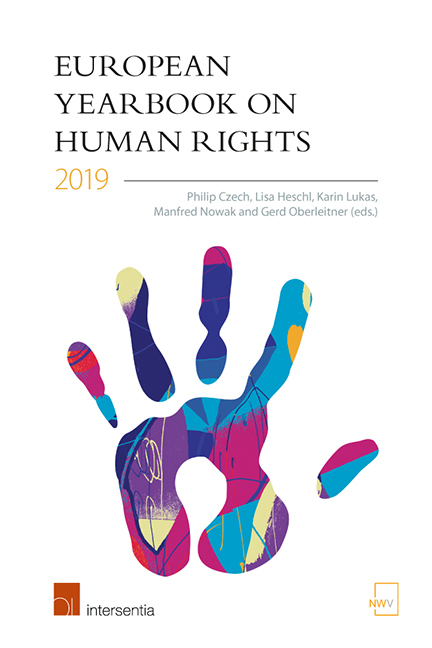Book contents
- Frontmatter
- Miscellaneous Frontmatter
- Editors’ Preface
- Contents
- List of Abbreviations
- List of Contributors
- PART I TOPIC OF THE YEAR
- PART II EU
- PART III CoE
- The Jurisprudence of the European Court of Human Rights in 2018
- Blasphemy and the European Court of Human Rights: A Small Step Forward, a Giant Leap Back
- How Do European Courts Approach the Sensitive Topic of Same-Sex Marriage? An Analysis of the Case Law of the ECtHR and the CJEU in the ‘Catch 22’-Field of Equal Marriage Rights
- The European Court of Human Rights and the Human Rights Model of Disability: Convergence, Fragmentation and Future Perspectives
- The Undermining of Article 6 ECHR
- The Right to a Nationality in Recent Case Law of the European Court of Human Rights and Council of Europe Bodies’ Work
- PART IV OSCE
- PART V REPORTS FROM THE FIELD
- PART VI OTHERS
- PART VII BOOK REVIEWS
- Index
The Undermining of Article 6 ECHR
from PART III - CoE
Published online by Cambridge University Press: 24 January 2020
- Frontmatter
- Miscellaneous Frontmatter
- Editors’ Preface
- Contents
- List of Abbreviations
- List of Contributors
- PART I TOPIC OF THE YEAR
- PART II EU
- PART III CoE
- The Jurisprudence of the European Court of Human Rights in 2018
- Blasphemy and the European Court of Human Rights: A Small Step Forward, a Giant Leap Back
- How Do European Courts Approach the Sensitive Topic of Same-Sex Marriage? An Analysis of the Case Law of the ECtHR and the CJEU in the ‘Catch 22’-Field of Equal Marriage Rights
- The European Court of Human Rights and the Human Rights Model of Disability: Convergence, Fragmentation and Future Perspectives
- The Undermining of Article 6 ECHR
- The Right to a Nationality in Recent Case Law of the European Court of Human Rights and Council of Europe Bodies’ Work
- PART IV OSCE
- PART V REPORTS FROM THE FIELD
- PART VI OTHERS
- PART VII BOOK REVIEWS
- Index
Summary
ABSTRACT
In 2018, the European Court of Human Rights’ case law continued to raise significant questions about the nature of criminal fair trial rights under Article 6. This contribution considers the Court's recent case law on Article 6, with a particular emphasis on developments in cases such as Beuze v Belgium of November 2018. This contribution argues that the Court continues to undermine the text of the Convention through its interpretation of Article 6's ‘internal structure,’ with undesirable consequences for assessing violations in future applications. Moreover, the contribution argues that the case law demonstrates dangerously greater willingness to countenance public interest justifications and balancing in the context of Article 6. The finding in Beuze was that Belgium had violated Article 6 rights; the legacy of Beuze and the trends evident in the 2018 case law will be that governments in future applications will find it increasingly easy to justify infringements of those rights. Despite its protestations to the contrary, it seems that the Court intends to convert Article 6 into a two-word ‘fair trial’ guarantee, under which every application boils down to whether or not the overall proceedings were fair. This should trouble those who take an interest in the most heavily-litigated provision of the Convention.
INTRODUCTION
Article 6 of the European Convention on Human Rights (ECHR) has long been the most heavily-litigated of the ECHR's provisions. In 2018, more Article 6 violations were found than violations of Articles 2, 4, 7, 8, 9, 10, 11, 12, 13, and 14 – combined. The European Court of Human Rights (the Court) (ECtHR) routinely refers to aspects of Article 6 as being ‘fundamental’ and emphasises ‘the prominent place held in a democratic society by the right to a fair trial’’.
Given the significance of Article 6 to the ECHR system, therefore, the Court's case law on its provisions deserves careful scrutiny. This contribution is critical of the Court. It argues that the result of scrutiny being applied to recent cases should be concerning to anyone who takes an interest in this important provision. Indeed, I argue that the protections provided by Article 6 are being undermined by the Court's recent case law, particularly in the context of criminal proceedings. In a series of judgments, the Court has been answering crucial questions about Article 6's structure and drafting, and doing so in ways that seem removed from the text of the ECHR.
- Type
- Chapter
- Information
- European Yearbook on Human Rights 2019 , pp. 295 - 312Publisher: IntersentiaPrint publication year: 2019



